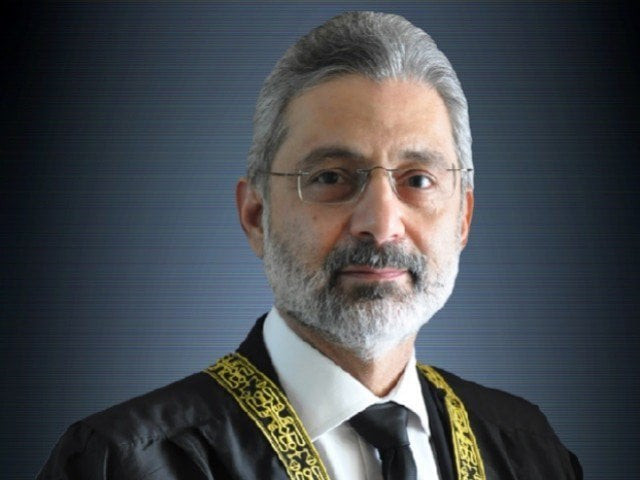Senior judges’ divergent views expose tensions
Justice Isa questions top judge’s authority to make special benches

The country’s top court has held that all cases that various Supreme Court benches are hearing under Article 184(3) of the Constitution be postponed until amendments are made in the Supreme Court Rules, 1980, regarding the discretionary powers of the chief justice of Pakistan (CJP).
A three-judge special bench of the Supreme Court issued the order on Wednesday with a vote of 2 to 1, while hearing a suo motu case related to grant of 20 additional marks to a Hafiz-e-Quran student seeking admission to MBBS or BDS programmes.
The special bench, formed by CJP Umar Ata Bandial, was presided over by Justice Qazi Faez Isa. Justice Aminuddin Khan and Justice Shahid Waheed were also part of the bench.
Read: Justice Isa questions provisions of 'special bench' constitution
The ruling came as the National Assembly on Wednesday unanimously passed the Supreme Court (Practice and Procedure), Bill 2023, curbing the CJP’s suo motu powers.
Authoring the majority judgement, Justice Isa noted that neither the Constitution nor the Supreme Court rules give the CJP the power to make special benches or decide as to which judge will be on a certain bench.
"The rules do not grant any power to [the SC] registrar or to the chief justice to change a judge or judges on a bench or to reduce their number," the order stated. Justice Aminuddin Khan also endorsed Justice Isa's views. However, Justice Shahid Waheed dissented from the order.
The order noted that three categories of cases fall under Article 184(3) of the Constitution,
"Firstly, when a formal application seeking enforcement of fundamental rights is filed. Secondly, when (suo motu) notice is taken by the Supreme Court or its judges. And, thirdly cases of immense constitutional importance and significance (which may also be those in the first and second category).
“Order XXV of the [SC] rules only attends to the first category of cases. There is no procedure prescribed for the second and third category of cases.” The order noted that it is a serious matter as no appeal can be filed against a verdict issued in suo motu cases.
"The rules also do not provide how to attend to the following matters: (a) how such cases be listed for hearing, (b) how bench/benches to hear such cases be constituted and (c) how judges hearing them are selected."
The majority order also said that the top court rules also do not tell as to how cases be listed for hearing, how bench/benches to hear such cases be constituted and how judges hearing them are selected.
During earlier proceedings of the case, Justice Isa had questioned whether the SC rules allow formation of special benches in the first place.
Read more Nawaz's disqualification continues to haunt ex-CJ
"Where is the concept of the special bench," he had asked, adding: “They (the three) judges were sitting in different benches in the morning".
He said the constitution of special benches would create "misgivings" and open the apex court to "criticism". Appearing before the court, Attorney General for Pakistan Shehzad Ata Elahi has said that there were precedents for special benches. He had sought time from the court to assist it on the matter.
Justice Isa also wondered why the matter of granting 20 additional marks to Hafiz students was listed before a bench after 14 months. Expressing his deep concerns, the senior judge said that the SC "is a completely unaccountable institution" and that therefore "we must proceed with utmost caution".
"What is the due process," Justice Isa asked, "if one case is listed for hearing the very next day after being filed while another is listed after a delay of several months?"
The SC judge also expressed reservations over the ban on criticising state institutions – in particular the conduct of superior courts – by the country's media regulatory body, the Pakistan Electronic Media Regulatory Authority (Pemra).
"Why should my conduct not be discussed if I do something wrong?" he said. "Does Pemra want to create a police state?" He also asked what the term “state institutions” even meant.
"The Federal Shariat Court could even declare the Pemra orders as unIslamic," he remarked.
Winds of change?
After issuance of recent cause lists, legal experts have begun debating as to whether winds of change have finally started blowing in the apex court as earlier questions were being raised about not including two senior most judges – Justice Isa and Justice Sardar Tariq Masood – in special or larger benches hearing constitutional and politically sensitive cases.
There is a strong perception that some particular judges were being preferred for most of the politically sensitive matters for the last five years, while others are not – a matter made further controversial by Justice Syed Mansoor Ali Shah's remarks in another case.



















COMMENTS
Comments are moderated and generally will be posted if they are on-topic and not abusive.
For more information, please see our Comments FAQ